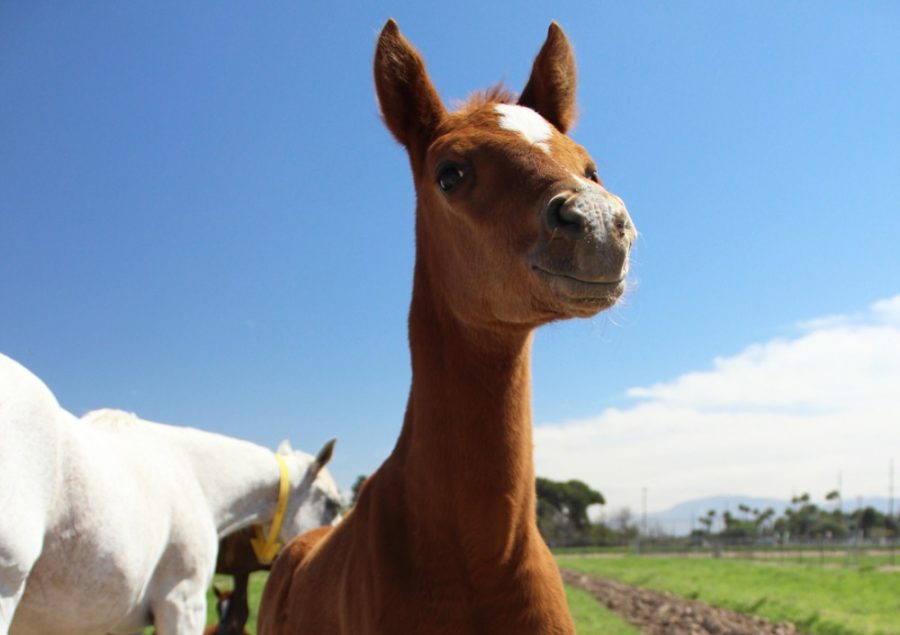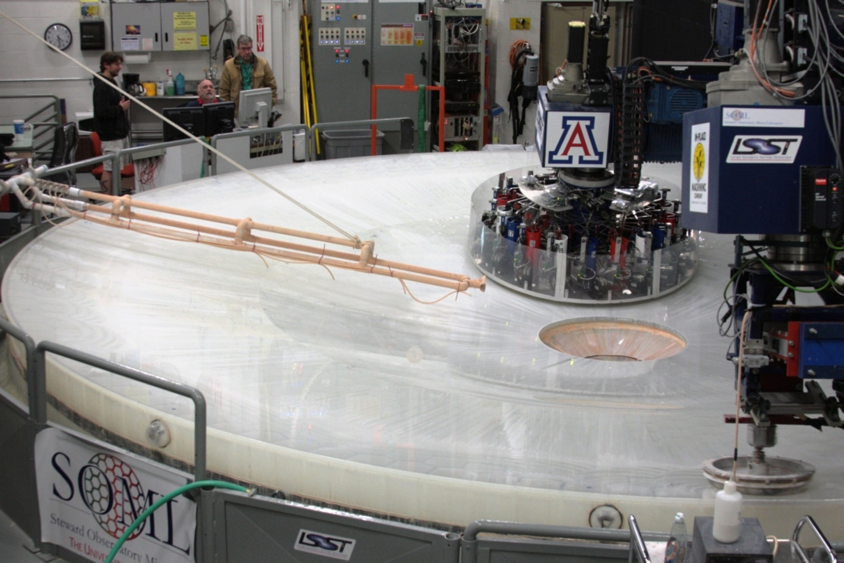A baby horse throws her head and stretches her spindly legs. Her mother has moved a few yards away, in search of green grasses to munch on. The foal awkwardly trots to her mother’s side, still getting used to the sensation of walking. The foal’s birth place? The UA.
For the first time, the UA-affiliated Tucson Area Agricultural Centers are now home to 20 Arabian broodmares — female horses kept for bearing baby horses, called foals — as part of its Equine Center. This was made possible by Ruth “Bazy” Tankersley, who passed away in 2013, leaving the UA her Al-Marah Horse Farm in East Tucson. So far, the Agricultural Center, also known as “the farm,” has seven Arabian foals, an expensive and sought-after breed, with three more on the way by the end of May.
According to her memorial in Modern Arabian Horse Magazine, Tankersley was born in 1921 and grew up in New Mexico, where she picked up her mother’s love of Arabian horses. Her breeding program grew into the largest and best recognized program in the United States, which she relocated to Tucson in the 1970s.
What makes the horses even more unique is that they come from the prestigious Crabbet line of Arabians, one of the most famous Arabian pedigrees in the world.
“No discussion of Crabbet horses can be conducted without mentioning the role of Bazy Tankersley,” according to the Arabian Horse Association. “It would be fair to say, her [Tankersley] foundation stock set the standard for producing champion Arabian horses, and that legacy continues today.”
Kacee Adams, the barn manager at the Agricultural Center, said they sell the horses in order to “keep [their] doors open.”
The foals are born and raised at the Agricultural Center, and present a valuable teaching resource to students in the Equine Center. As the foals progress to yearlings, they are trained for a variety of tasks, all involving humans as handlers or riders.
“We focus on training them to work with humans,” said Shelby Young, a senior studying agricultural and life sciences. “It is a huge learning opportunity.”
The Arabian foals will be trained for competition in horse shows and most likely sold to private people who compete in a variety of different equine sports. Tankersley’s endowment provided the center with the opportunity to switch focuses.
“This is a first for us,” Adams said.
While the Equine Center is no stranger to the breeding of horses for market, it has never dealt with Arabians before. Previously, the center was geared toward producing thoroughbred horses, which are primarily used for horse racing. Why the switch?
“The thoroughbred market in Arizona isn’t as strong,” Adams said.
Years ago, the young thoroughbreds that came from the Agricultural Center were selling for around $7500, though recently would fetch prices closer to $1000, according to Adams. Part of this is due to the recession, though there are other factors as well.
Horse racing in other states is competitive with Arizona, due to differences in gaming laws. While slot machines and other forms of gambling are permitted in New Mexico, for example, they are illegal in Arizona. This greater draw, coupled with breeder subsidies, makes thoroughbred racing bigger in those states, which in turn makes the Al-Marah stables all the more important for the Equine Center and the College of Agriculture and Life Sciences as a whole.
While the stables — and the horses — have just become available to the UA, the university doesn’t actually own the property quite yet.
“The official transfer hasn’t happened yet,” said Wendy Davis. “It could be the end of the week; it could be tomorrow.”
As for what the Al-Marah property would be used for, that is still under discussion. Committees have been formed with strategic planning in mind, coming up with the best allocation of the property to further the education of students in CALS, according to Davis.
This is a windfall for the Equine Center and something that Tankersley wanted to happen for some time. She had included this transfer in her estate planning some 15 years ago, Davis said.
“Her intention was not to sell it into development but to keep it an equine facility,” Davis said. “I think Mrs. T would be very pleased that they are being used for education.”
Students will get a chance to work with these prestigious bloodlines for years to come, helping to keep the Equine Center viable.
_______________
Follow Erik Kolsrud on Twitter.









